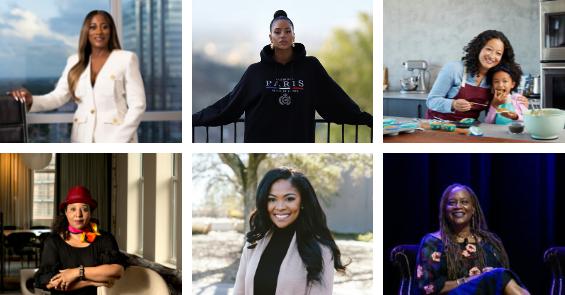Britney Winters, founder and CEO at Upgrade Boutique; Courtne Smith, CEO and co-founder, NewNew; … [+]
DEVON COLEMAN, PHOTOCRED, PARTAKE FOODS, Karjean Levine, @THEBROSFRESH, ANITAB
August 28 marks the 58th anniversary of Martin Luther King’s “I Have a Dream” speech. He called for civil and economic rights and an end to racism in the U.S. We’re still fighting that battle.
In a month that we also celebrate Black businesses and women’s equality day, it seems appropriate that we also give a nod to the one-year anniversary of Crunchbase for tracking founders, and angel and venture capital investors by gender, race, and ethnicity, and nudging more people to contribute that information to its database.
Crunchbase provides data on private companies raising equity investments and their investors. Its Diversity Spotlight feature shines a light on the diversity in the leadership teams of startups and venture capital firms. Partner organizations like All Raise get out the word about contributing demographic data. In the last year, 1,393 contributors have updated 23,604 company profiles with diversity data. Academics have expressed interest in analyzing the data, commented Jager McConnell, Crunchbase’s CEO.
“The BIPOC community has been invisible for too long in the entrepreneurial community. Facts are facts and it’s time for the market to see the abundance of deals and opportunities that I and my team see and invest in,” said Gayle Jennings-O’Byrne, Co-founder, WOCstar Fund—an investment fund focused on tech startups led by women of color, Native Americans, immigrants, and founders from the heartland. “I’m hopeful that such data will help other market players to invest and engage founders and funders differently because there is a lot of opportunity in diverse communities.”
As the saying goes, “What gets measured gets managed.” The purpose of measuring is to analyze and improve. The goal here is to provide data that will reveal venture capital’s diversity—or lack thereof—and hold it accountable, commented McConnell. The company also intends to add data about other demographics, including people with disabilities, sexual orientation, and veteran status.
First, let’s look at the big picture: women entrepreneurs in general. Considering that 49% of all businesses are a combination of women-owned businesses and firms owned equally by men and women, the number of companies raising venture capital with women on the founding team falls far short.
A combination of sole female founders and female/male founders raised $20 billion in 2020. Their share of venture investments is going backward, not forward: 12.6%—is far below the 18.1% raised in 2017. The proportion of female founders—22.9%—set a record in 2020. In 2020, the difference in the share of dollars—12.6%—and deals—22.9%— means that a female founder raised less money for her startup than her male-only counterpart. Female founders also raise a far lower percentage in later stages than their male-only counterparts.
The numbers for Black female founders are dismal. Black women represent 12.9% of the female population. Startups with Black female founders have raised $494 million for the first half 2021, surpassing the $287 million raised in all of 2020, according to Crunchbase. That’s the good news. The bad news is that companies with at least one Black female founder account for 2.6% of funding for all all female founders in the first half of 2021.
How can the entrepreneurial ecosystem improve?
Using data for accountability is a start. If McConnell has a dream, it would be that inequities highlighted in the data would result in government policy that requires a certain percentage of funding to be invested in diverse investments or in firms with underrepresented partners. He would also like investors to use the database to identify diverse investment opportunities.
If I have a dream, the government would require all financing options, including equity and debt, to capture demographics for accountability purposes.
Back in the fall, Tracy Gray, managing partner and founder of The 22 Fund, told me that if she had a dream, it would be for pension funds—especially government pension funds, whose employees primarily are women and people of color—to invest in venture funds owned and managed by people who look like them. The 22 Fund is a venture fund that invests in tech-based, export-oriented manufacturing companies to create clean jobs in under-served and low- to moderate-income communities.
Still more is needed to create an environment in which female (and male) founders thrive.
Andrea Ippolito, a female founder, writes in Crunchbase about her dream. For her, it’s about fixing the systemic challenges that hold female founders back. She wants to normalize:
- Paid parental leave for all founders, not just women.
- Not working 100-hour workweeks.
- Participating remotely in accelerator programs.
- Flexible structures for startup team members.
To Ippolito’s list, I’ll add the need for affordable childcare.
“People should use this data to stop making excuses for why they haven’t invested in BIPOC founders and funds,” said Jennings-O’Byrne. “The narrative about a lack of BIPOC deal flow, investors, founders, and funders is WRONG. Stop asking if there is any pipeline and start investing.”
“This isn’t a charity,” said Courtne Smith, CEO and co-founder, NewNew. “We should be viewed as equal based on the great work we do, the value we add, and the value we create for our consumers and for our investors.”
What is your dream solution to the lack of diversity in startup funding?




